The odor was there. Not overpowering, but “off” and definitely not normal. My six-year-old Bouvier Atle’s breath simply never, ever stank. Yet here it was. Some kind of skanky odor emanating from his sweet little face. Was it time for a dental cleaning?
If you detect a stench coming from what you think is your dog’s mouth, and you chalk it up to dirty teeth, you may want to think again. While the bad breath could be the result of dental disease, the foul odor could be the result of another condition.
When Your Dog’s Mouth Smells
We often consider dental disease – the buildup of plaque and calculus on the teeth and inflammation of the gums (gingivitis) – as the main cause of bad breath in a dog. While the seriousness of dental disease shouldn’t be minimized, there are lots of other reasons why your dog’s mouth might smell off. Other causes of unpleasant odors include:
- The tongue
- Metabolic diseases, such as diabetes and renal disease
- GI issues from excessive licking or swallowing, creating excess gas in GI tract
- GI upset caused by megaesophagus, food allergy, bacterial overgrowth, neoplasia (cancer of the stomach or intestines), or a foreign body (bones, rocks, toys, socks)
- Dietary (fish-based diets, oral fatty acids, coprophagia, consumption of other fetid foodstuffs)
- Maldigestion
- Respiratory disease (rhinitis, sinusitis, neoplasia)
- Non-periodontal oral disease (orthodontic, pharyngitis, tonsillitis, neoplasia)
- Autoimmune disease
- Oral cancer
- Trauma (oral foreign bodies, damaged palate from stick chewing, electric cord injury, caustic agents)
Understanding the origin of the smell is your first assignment and may require the expertise of your veterinarian, or veterinary specialist, to pinpoint. T-cell lymphoma, for example, is a rare but deadly disease that can present on the face. It mimics many other conditions and can be difficult to diagnose without a specialist’s intervention.
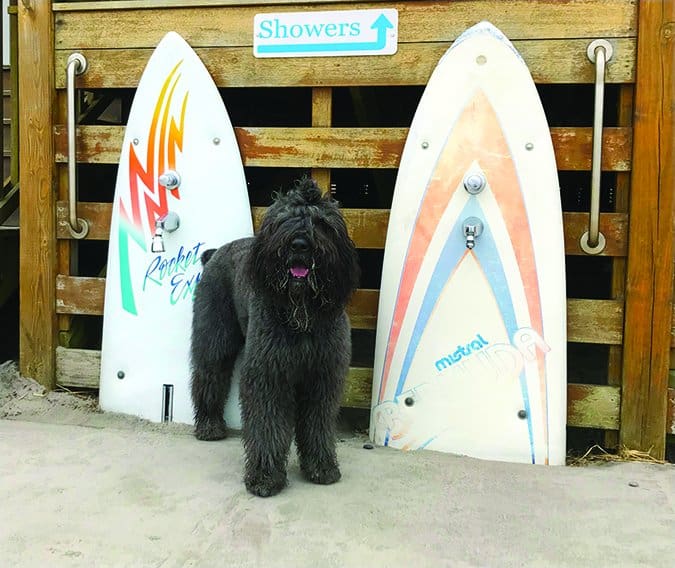
Why Does My Dog’s Head Stink?!
I became obsessed with examining Atle’s face, closing his mouth, taking a whiff, opening his mouth, taking a whiff…
I thought maybe his beard was the culprit and became zealous about daily beard washing; this didn’t eliminate the stink.
He’s a dog who has allergies, and while I hadn’t noticed him excessively licking any body parts, he can be a “closet” licker; we tried a short trial of Apoquel (a prescription drug for dermatitis) but the odor remained.
Next, we experimented with a course of Pepcid, along with a probiotic, to see if mild GI issues were at the root of his ills, or if licking had thrown off the bacterial balance in the gut. Still no resolution.
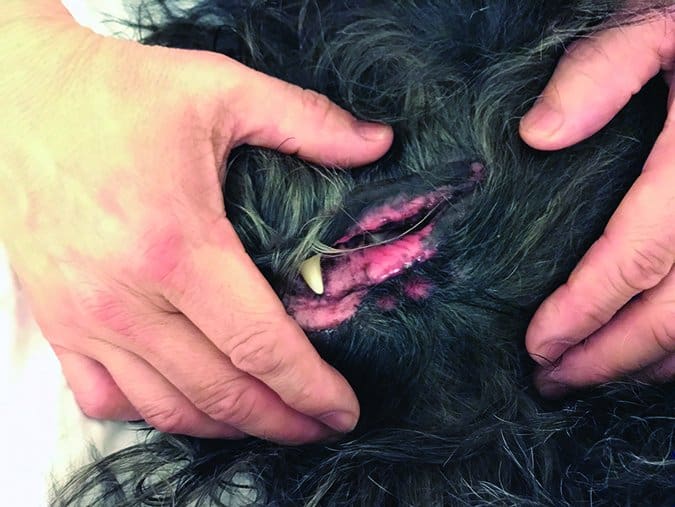
We visited our veterinarian, who reported that his teeth and gums looked pretty good, with just a tiny bit of tartar buildup, but maybe a cleaning was in order. She mentioned that some dogs retain moisture on their faces, but didn’t pursue that issue; his face looked great.
The odor lingered for a few months without any noticeable pimples or growths on his face or in his mouth, until we took a road trip south to Georgia in April. The further south we got, the itchier Atle got. Within a day, there were hotspots on each side of his lower lip.
I sent a photo to his board-certified veterinary dermatologist, Tiffany Tapp, DVM, DACVD, and she quickly diagnosed “lip-fold pyoderma.” She told me how to treat it using topical products and – voila! – by the next day, the odor that had lingered for a few months was completely gone. We’d found our answer.
Dermatologic Causes of Bad “Breath” in Dogs
Lip folds, facial skin folds, and even a dog’s ears can produce odor that appears to be coming from the mouth – but isn’t. Skin folds and ears: I know what those are! But the lip fold completely escaped me. In many dogs, it’s a tiny, barely perceptible crevice on the lower jaw, on each side of the mouth, in the area where lip mucosal tissue meets haired skin.
Lip-fold pyoderma is a form of skin-fold pyoderma (intertrigo complex) and, guess what – it stinks! Wet and warm, lip (and facial) folds provide everything that pathogenic bacteria and/or yeast need to take up residence. The condition is more prevalent in dogs with loose jowls, droolers and slobberers, and those with deeper lip and skin folds on their faces, like brachiocephalic dogs. Spaniels, German Shepherd Dogs, Bulldogs, Mastiffs, and Newfoundlands are just a few of the breeds prone to the condition. But it may also present in dogs who swim or whose lip folds tend to stay wet.
That, evidently was Atle’s issue: daily beach trips and frequent face washes (without drying), combined with normal water consumption, set the stage for bacteria to thrive in his lip folds. When I pushed Dr. Tapp to tell me how, at six years of age, Atle could suddenly develop lip-fold dermatitis, she said he may have experienced cumulative changes in his skin barrier or an increase in allergen exposure. And, horrors – his lip could be getting droopier with age, or he may have undergone subtle anatomic changes, creating a lip-fold issue.
Likely, she thought, it was a number of things, with the most common predisposing changes being moisture and heat. Allergy produces inflammation which leads to heat; daily beach trips, every day slobber, and water bowls contributed moisture to complete the recipe for this stinky, unhealthy issue.
How to Prevent Skin Fold Pyoderma
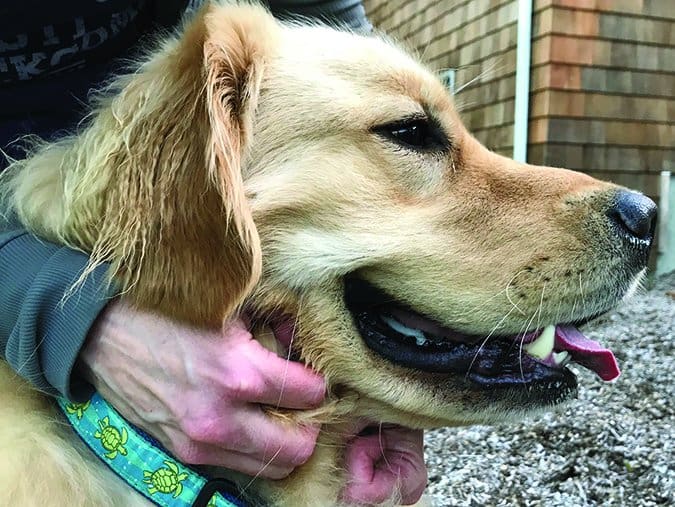
If your dog fits into one of the above categories, prevention is your best friend for keeping lip-fold (and skin-fold) pyoderma at bay. Some dogs do well if the hair on their lip folds is kept trimmed short. For dogs whose lip and face folds retain moisture, daily wiping of the folds helps. Dr. Tapp likes a 50/50 solution of white vinegar and water or an over-the-counter astringent such as Domeboro (available over the counter in most pharmacies).
Dr. Tapp has had good success (and so have we) with veterinary-prescribed Vetericyn VF spray, a pH-balanced, super-oxidized hypochlorous acid (HOCl) solution that is non-toxic, non-irritating, and shows microbial inhibition. The spray is safe to use on the face, lips, and around the eyes; the product mimics the killing power of neutrophils (that produce HOCl during their “oxidative burst”) and works well for maintenance to clean, reduce odor, and kill bacteria without developing resistance since it isn’t an antibiotic.
Wiping with a chlorhexidine wipe or spray such as the pet product Douxo Chlorhexidine may work for your dog, too.
As with any kind of infection, advanced lip-fold pyoderma may require an oral or topical antibiotic and/or anti-yeast medication to treat. Your veterinarian can do a simple cytology test to diagnose whether an infection is bacterial or yeast-based and then prescribe the appropriate treatment.
As a last result, for dogs with chronic lip-fold infections, a fairly simple surgery (cheiloplasty) to eliminate the skin fold may be the best intervention, as it essentially makes the problem go away forever. Yep, your dog may get a face lift before you ever do!
Dog Has Smelly Ears?
I had a hard time believing that a dog’s ears could be the source of an offensive odor that could be attributed to a dog’s mouth. Dr. Tapp was quick to tell me that often, only more severe ear disease is visible to us; early ear disease may not be visible but can omit an “off” odor that’s hard to pin down. Dr. Tapp’s own Golden Retriever’s head sometimes smells, and she says, “Sometimes it’s yeast in his ears, sometimes something gross he ate, and sometimes an inflamed lip fold.” Good to know we are not alone!
Smelling is Believing
In Atle’s case, what was so mysterious was that I saw nothing that looked amiss on his chin or lip fold to indicate a problem. In hindsight, I now realize that the mucosa attached to his lip was inflamed and bright red at times, as opposed to a more subdued, quiet pink.
Atle most likely will continue to be prone to lip-fold dermatitis, but with dedication to keeping the area clean and dry, we’re less likely to see a full blown bacterial infection that would require oral medication.
If you smell “bad breath” there is a good chance that help from a general -practice veterinarian or specialist may be needed to locate and diagnose the problem. Serious signs such as bleeding, redness, oral discharge, unusual eating habits or anorexia are clear signs of a problem. But don’t discount the importance of getting to the root of subtler, stinky issues. Your dog – and your nose – will thank you.
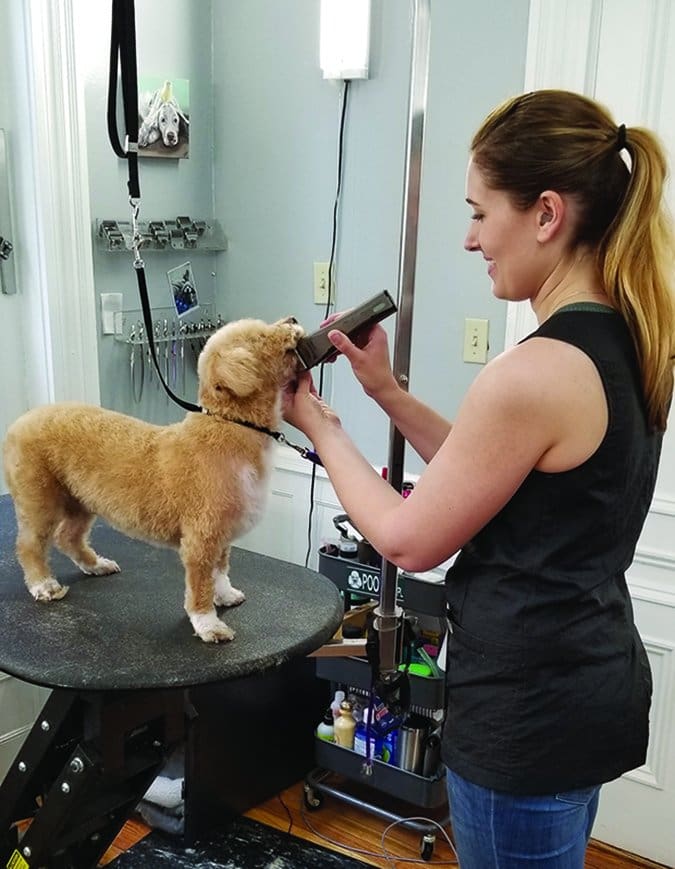
Pawsh Dog Boutique & Salon
Groomer’s Advice: Shave and Dry the Lips
Amy Stempel (seen here) grooms dogs at Pawsh Dog Boutique & Salon in Boston. She has groomed thousands of dogs over her 16-year career, winning multiple awards in professional grooming competitions along the way. And she is familiar with lip-fold dermatitis!
Stempel says she tends to see lip-fold issues in the spring and fall, when allergy season is in full swing. Dogs whose faces tend not to ever dry out – those with hairy damp faces, those who swim a lot, excessive droolers – are the most likely to show up at the salon with lip-fold issues. Like me, most of her clients assume the dog has bad breath or a wet beard smell!
To help with prevention, she routinely shaves hair off of her clients’ lips and recommends keeping beards clean and dry.


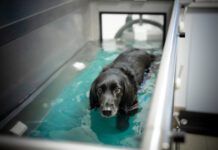
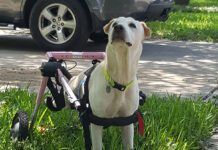


Hey 🙂
You’re probably swimming in emails so I’ll make this snappy…
I’m emailing you because I noticed your site www.whole-dog-journal.com/ had a page that mentioned about bad dog breath here: https://www.whole-dog-journal.com/health/dog-has-bad-breath/ I wanted to let you know my team and I just finished up a fairly comprehensive guide on How Clean Is Your Dogs Mouth?. We spent about 20-30 hours on research and writing with our goal to publish something a bit more critical covering the good, the bad, and the ugly of stinky breath We really wanted to take a deep look at the problems behind bad dog breath, and now we’re trying to get the piece “out there” and in front of people who might enjoy it or get value from it. That being said, I think it could make for a great link as additional resources on your page above. Here it is: https://bestdogdigest.com/dog-health/how-clean-is-a-dogs-mouth/ What do you think? No worries either way! -Eileen P.S. If you couldn’t care less to teach folks about dogs stinky breath and want me to go away, I totally understand, just reply with “not interested” or my favorite, “skedaddle” … No hard feelings 🙂 P.P.S. If I’m emailing the wrong person about this, I apologize, I just went with the first email I could find! Thank you and have a wonderful day!
Eileen